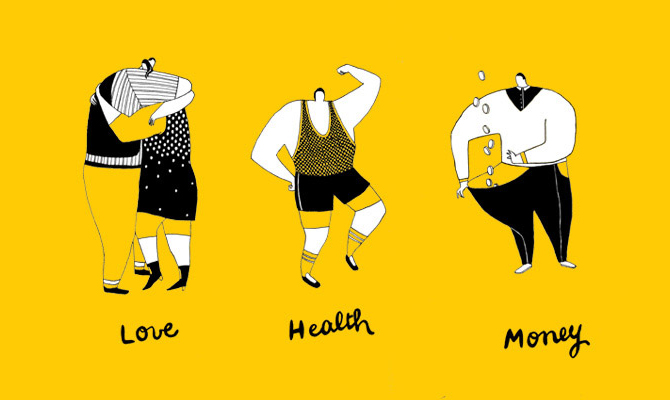Hello! Welcome
to Ailadi’s land :-)
"What is Today’s Definition of “Happy”?"
What does CCTV’s annual survey of happiness in China really tell us? Here, we analyze the data and look for fresh patterns and conclusions.

Article published on a China Insight Issue by design mind
Read the article below the images or on design mind






Here the complete article by Vivian Weng 翁维蔬
Meet 28-year-old Joe, one of the happiest people in China. Joe lives in Taiyuan, a Tier 3 city in the Shangxi province with a population of 4.2 million people. He has a bachelor’s degree in engineering, is married, but has no kids. An engineer, he makes about 100,000 RMB, slightly more than the average household in Taiyuan.
Unlike some of his college friends, who moved to Shanghai after graduation and need to work long hours in order to make enough money to buy an apartment, Joe and his wife already bought their first apartment and car last year. Joe spends about four hours each day on leisure-time activities like going online to read news, listen to music, or watch the latest movie or popular sitcom. On weekends, he likes to go shopping with his wife and meet up with friends to play basketball. Joe is not at all worried about his future income. He believes that it will continue to grow as the local government promotes economic growth and urbanization. If possible, he wants to start investing, both in the stock market and in real estate—by owning a second property. What really affects his happiness is not his income or even his health, but rather the social welfare system and his relationship with his wife.
CCTV’s 10,000-household economic report
Based on a 2012 survey conducted by CCTV, roughly 13% of Chinese are just as happy as Joe—a composite we’ve created that represents the characteristics of respondents. “The ordinary Chinese people never measure their life satisfaction happiness using GDP,” according to the Associate Dean of Research Institute of National Development in Peking University. While the government and many academic institutions publish massive amounts of statistics that more or less measures China’s economic well-being, based on factors such as consumer pricing index, development index, social welfare index, etc., these macro indicators are often highly correlated with GDP and therefore provide us with very little insight into the micro view of the economic well-being of the average Chinese person. Every year since 2007, CCTV has conducted a nationwide survey to gain deeper understanding of the relationship between economic behaviors, living conditions, and life satisfaction. Their 2012 survey covered 10,000 households in 104 cities and 300 counties across China.
The price of happiness equals 100,000RMB
Based on the survey, the primary factor currently affecting the well-being of Chinese people is income level (56%), next is health (49%), with marriage or relationship with a loved one (32%) coming in third place. The survey showed that married people are significantly happier than unmarried people, reflecting the fact that there is a tremendous amount of social pressure to get married in today’s Chinese society. Only less than 13% of the respondents believe that “self growth,” or any activity that helps someone acquire new skills, positively impacts their well-being.
The data also shows that for those who say that they are happy, health is the primary factor in impacting their well-being, whereas for people who are unhappy, income is the primary factor. This implies that once income hits a certain threshold, more income cannot bring more happiness. What is that threshold? According to the survey, it’s around 100,000RMB.
The indifferent middle segment
While only 12% of respondents are not unhappy, there is a large proportion of people (43%) who appear to be neither happy nor unhappy about their life. This “middle segment” is an interesting group. They make 20,000–50,000RMB per year and therefore are not considered “middle class.” Mostly found in Tier 1, 2, 3, or 4 cities, they enjoy one to three hours of leisure time per day, which they mostly spend just watching TV or browsing online, mainly because they are the cheapest forms of entertainment. They don’t like to read, shop, play sports, or even socialize (online or offline). They don’t believe that their income will increase much in the future and their biggest worry is that they will never make enough money to buy a house. It seems they pretty much don’t care about anything except inflation and real estate regulation. Based on their responses, it appears that enhancing the disposable income of this segment would be the only way to stimulate their economic participation.
Leisure Time: New opportunities for entertainment services?
A compelling fact from the survey is the relative lack of leisure time among Chinese citizens of all economic levels. More than 70% of respondents have less than three hours of leisure time per day, and only 7% of the respondent enjoy as much as five hours of recreation time per day. To put that in context, according to the latest American Time Use Survey (2011) from the U.S. Bureau of Labor Statistics (BLS), U.S. citizens have more leisure time than the Chinese. In the U.S., employed adults living in households with no children under 18 engage in leisure activities for 4.5 hours per day; employed adults with a child under age six enjoy 3.5 hours of leisure time per day.
What do Chinese people do during their leisure time? Regardless of age, gender, educational background, income level, or overall feeling of happiness, the two favorite leisure activities are surfing the Internet (54%) and watching TV (46%). Fewer than 16% of respondents are engaged in cultural activities such as going to the theater or visiting museums during their leisure time (by comparison, most Americans over age 14 spend more than half their time watching TV).
These statistics offer businesses insight into what types of new entertainment services might appeal to Chinese consumers. Online delivery is clearly important. Less time-consuming activities like games or fictional narratives might better suit the Chinese, who typically have less leisure time than their Western counterparts, as they aspire to reach the level of happiness of the not-so-average “Joe.”.
Survey statistics